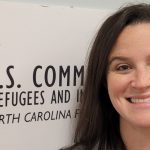The Syrian displacement crisis is one of the world’s largest refugee crises. The situation escalated during the Syrian Civil War (2011-2024), when millions were displaced internally and abroad due to war, repression, and economic collapse under Bashar al-Assad’s rule. Assad’s regime deliberately used displacement as a weapon through sieges, chemical attacks, and the deliberate targeting […]
Category: USCRI Programs
Immigration Litigation: Nationwide Injunctions
You may have seen recent headlines stating that executive actions have been blocked by a federal judge. For instance, on February 25, a federal judge in Seattle blocked parts of an executive order indefinitely suspending the U.S. Refugee Admissions Program (USRAP), and on April 14, a federal judge in Boston blocked the Department of Homeland […]
Children of Men: Wastelands and Hope
Note: Spoilers and details of violence ahead. “Borders will remain closed. The deportation of illegal immigrants will continue.” These are the opening lines of Children of Men. This cinematic essay was directed by Alfonso Cuarón and released in 2006. Over the years, it has been heralded as a premonition. Its imagery has been […]
The 1951 Refugee Convention: Sexual Orientation and Gender Identity
For a backgrounder on the refugee definition, see “Defining ‘Refugees’—An Exclusionary Legacy.” The 1951 Convention relating to the Status of Refugees, amended by the 1967 Protocol, defines a “refugee” as any person who “owing to well-founded fear of being persecuted for reasons of race, religion, nationality, membership of a particular social group, or political opinion, […]
Standing with Refugee Children
What does it mean to become a refugee before you’ve even had the chance to grow up? From Syria to Sudan, Myanmar to Afghanistan, children around the world are being displaced at unprecedented levels. Some are too young to understand why they’re running; others carry memories of war, persecution, or violence no child should ever […]
Invisible Hands: Confronting Child Labor in Global Supply Chains on World Day Against Child Labor 2025
The açaí in your health bowl, the cocoa in your chocolate, the coffee in your latte, the copper in your phone—what do they have in common? Child labor. For millions of children, they represent long days of hazardous work instead of school, play, or rest. On World Day Against Child Labor 2025, we pause to recognize […]
When the Law is Not Enough: The Persecution of LGBTQ+ Colombians
June is Pride Month in commemoration of the anniversary of the Stonewall riots, an uprising against the state-sponsored persecution of queer-and-trans people. Today, more than fifty years later, queer-and-trans people remain persecuted. On paper, Colombia has some of the strongest protections in the Americas for lesbian, gay, bisexual, transgender, and queer (LBGTQ+) individuals. But it […]
Supporting Relationships: Refugees and Host Communities
Cover Image Source: SuSanA Secretariat A refugee camp is a temporary settlement for the protection and aid of displaced populations. For refugees, a refugee camp can be an immediate safe haven. Host countries and international organizations establish refugee camps for a number of reasons. Refugee camps can be a politically expedient method of influx management, a […]
Administration Revokes Protections for Venezuelans
The U.S. Committee for Refugees and Immigrants (USCRI) is dismayed by the Administration’s revocation of Temporary Protected Status (TPS) for Venezuela. Just weeks ago, on January 10, 2025, an extension for TPS was announced, and on January 17, 2025, it was published to the Federal Register—only to be abruptly rescinded. TPS is a lifesaving humanitarian […]
Defining “Refugees”—An Exclusionary Legacy
International organizations were born in the aftermath of devastating world wars. Nations set up international institutions and covenants, seeking to never repeat the devastation arising out of those wars. But first, they had to tackle an unprecedented mass displacement crisis. Due to warfare, destruction, and persecution, millions of people were driven out of their homes. […]









































